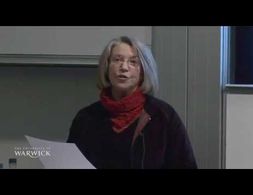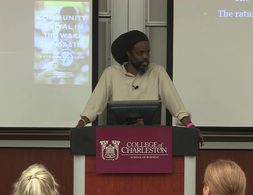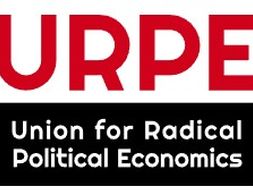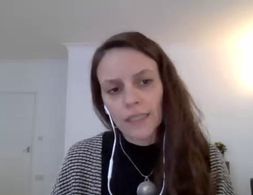✕
413 results
Does Karl Polanyi's work “The Great Transformation” serve to analyse the current multiple crisis and social movements? Nancy Fraser revises Polanyi's concept of a double movement to capture social forces in the aftermath of the economic crisis of the 1930s – on the one side marketization and on the other hand social protection. Fraser proposes to talk about a triple movement and to account for emancipatory struggles. In the lecture, she discusses interactions as well as conflicts between those three forces, in particular conflicting aims of social protection. The lecture presents the content of her paper “A TRIPLE MOVEMENT? Parsing the Politics of Crisis after Polanyi“ in the New Left Review (2013).
Stratification economics is defined as a systemic and empirically grounded approach to addressing intergroup inequality. Stratification economics integrates economics, sociology and social psychology to distinctively analyze inequality across groups that are socially differentiated, be it by race, ethnicity, gender, caste, sexuality, religion or any other social differentiation.
In this essay the authors take a look at how welfare could be provided in a degrowth society.
Participants should be able to distinguish the strictly non-cooperative (methodological individualist) foundations of traditional neoclassical economics as being couched in self-interested individuals, as well as having basic knowledge of an alternative set of theories based on the primacy cooperation and social norms and extending the breadth of economic analysis beyond exchange.
Austrian economics focuses on the economic coordination of individuals in a market economy. Austrian economics emphasises individualism, subjectivism, laissez-faire politics, uncertainty and the role of the entrepreneur, amongst others.
Neoclassical economics focuses on the allocation of scarce resources. Economic analysis is mainly concerned with determining the efficient allocation of resources in order to increase welfare.
Feminist economics focuses on the interdependencies of gender relations and the economy. Care work and the partly non-market mediated reproduction sphere are particularly emphasised by feminist economics.
Pluralism includes mainstream economics. Our campaign for pluralism, including this series, have generally focused on ideas outside the mainstream on the basis that it gets plenty of attention already so we want to spend our time exposing people to alternatives. Nevertheless, mainstream ideas deserve some attention. On top of this, a curious feature of modern economics education is that some of the best ideas from mainstream economics are not even taught to undergraduates! During this series I will explore such ideas, starting today with the market construction technique known as ‘matching’.
Is or has economics ever been the imperial social science? Could or should it ever be so? These are the central concerns of this book. It involves a critical reflection on the process of how economics became the way it is, in terms of a narrow and intolerant orthodoxy, that has, nonetheless, increasingly directed its attention to appropriating the subject matter of other social sciences through the process termed "economics imperialism".
Marxian Political Economy focuses on the exploitation of labour by capital. The economy is not conceived as consisting of neutral transactions for exchange and cooperation, but instead as having developed historically out of asymmetric distributions of power, ideology and social conflicts.
This book highlights the political economy of wealth and income inequality in Latin America. The author segments his analysis to separately evaluate the economic, social, and political costs of inequality building on country case studies. It draws well-contextualized lessons from the Latin American experience that is important to consider for other regional contexts, especially for social policies of nations within the 'Middle Income Trap'.
This course will introduce key concepts, theories and methods from socioeconomics. The first part of the course, will deal with the main economic actors and how their interactions are governed. Markets are seen as sets of social institutions. Institutions shape how consumers, firms and other economic actors behave. While it is difficult to understand how novelty emerges, we can study the conditions that are conducive to innovation. We will review how economic performance, social progress and human wellbeing are measured and what progress has been made. In the second part of the course, we will study a specific macroeconomic model that accounts for biophysical boundaries and inequality.
For many social critics "globalization" is a signpost of “late-capitalism” with the rise of multinational corporations, mass consumption and the multidirectional flows of capital, labor, media, communication, ideologies and social movements across national borders. Feminist analyses of globalization and the gendered and sexualized permutations of these phenomena offer a critical stance for theorizing these processes, and for studying their complex articulations across time and space.
This volume explores the relationship between law and economics principles and the promotion of social justice. By social justice, we mean a vision of society that embraces more than traditional economic efficiency. Such a vision might include, for example, a reduction of subordination and discrimination based on race, religion, gender, sexual orientation, age, disability or class.
As a response to ongoing economic, social and environmental crises, many private actors have enlarged their definition of 'value' to include environmental and social elements. Such practices, however, appear incompatible with the current epistemological structure of academic financial discourse.
In this talk, Virgil Henry Storr, a Research Associate Professor of Economics in the Department of Economics at George Mason University, talks about his research into to post-disaster recovery and the role that social entrepreneurship plays in rebuilding the communities and social networks that get disrupted, or entirely eliminated.
In this classic work of economic history and social theory, Karl Polanyi analyzes the economic and social changes brought about by the "great transformation" of the Industrial Revolution.
Recovery from the Covid-19 crisis provides a chance to implement economic measures that are also beneficial from environmental and social perspectives. While ‘green’ recovery packages are crucial to support economies tracking a low-carbon transition in the short-term, green measures such as carbon pricing are also key to improving welfare in the long-term. This commentary specifies the need for carbon pricing, outlines its implications for our everyday lives, and explains how it works alongside value-based change in the context of climate action and societal well-being.
Founded in 1968, The Union for Radical Political Economics (URPE) is an interdisciplinary membership organization of academics and of activists. Its mission is to promote the study, development and application of radical political economic analysis to social problems. Concretely, this involves a continuing critique of both the capitalist system, and of all forms of exploitation and oppression. URPE’s mission also includes, coming out of this critique, helping to construct a progressive social policy, and a human-centered radical alternative to capitalism.
The podcast exposes the concept and principles of co-operatives and the three main types of co-operatives: the consumer, credit and farmers buying and selling co-operatives. Furthermore, the history of the co-operative movement is presented. The authors draw the line from co-operatives to "degrowth" by arguing that these organisations discourage profit maximisation due to their ownership structure, their social purpose and their primacy of people over capital. The value of the members' co-operative share does not increase with the growth of a co-operative and it can not be used for speculation. Finally, the authors give examples for current co-operatives which empower (local) communities fostering social justice and environmentalism.
The authors discuss how identity affects economic outcomes by bringing together psychological and sociological perspectives and economics. For economic outcomes of a single individual, it might be interesting which kind of social groups this individual belongs to. This may influence individual daily decisions and hence economic outcomes. It can, however, not only affect individual economic outcomes but also economic outcomes of organizations, institutions and other groups. This paper describes these influences with respect to gender in the workplace, to the economics of poverty and social exclusion, and to the household division of labour.
Understanding gender inequality is possible only when looking at the intersections between race and class inequalities. The health crisis is no different: Stevano takes a feminist and social reproductive perspective, from unpaid household work to social infrastructure and services.
Steven G. Medema is a Research Professor at Duke University. His research focuses on the History of Economic Thought, having published extensively on the issue of social costs of production (conceptualized as externalities in neoclassical economics). In this recorded seminar, he exposes his working paper on the history of the concept of externalities in economic literature, starting from Pigou’s “The Economics of Welfare” (1920), where Pigou makes the case for governmental intervention in the market where there is a divergence between private and social costs or benefits of a productive activity. T
The 2007–08 credit crisis and the long recession that followed brutally exposed the economic and social costs of financialization. Understanding what lay behind these events, the rise of “fictitious capital” and its opaque logic, is crucial to grasping the social and political conditions under which we live. Yet, for most people, the operations of the financial system remain shrouded in mystery.
The global financial crisis (GFC) led to increasing distrust in economic research and the economics profession, in the process of which the current state of economics and economic education in particular were heavily criticized. Against this background we conducted a study with undergraduate students of economics in order to capture their view of economic education.
The core idea of ecological economics is that human economic activity is bound by absolute limits. Interactions between the economy, society and the environment are analysed, while always keeping in mind the goal of a transition towards sustainability.
This article, looks at the complex interaction between an urban economy and the vegetation within that urban area. In summary, numerous studies have found a positive link between increased vegetation and social as well as personal health. It makes a case for increasing urban vegetation as a way to benefit local economies.
A review of:
[1] Intermediate Microeconomics, H.R. Varian
[2] Mikrooekonomie, R.S. Pindyck, D.L. Rubinfeld
[3] Grundzuege der mikrooekonomischen Theorie, J. Schumann, U. Meyer, W. Stroebele
This article outlines the fundamental challenges of democratically planned economies and categorises proposed models into six groups, each of which approaches planning and coordination at different levels of authority and between myriad economic units in a particular way, taking into account efficiency as well as democratic principles and environmental and social sustainability. Through a classification system based on decision-making authority and mediation mechanisms, the article provides a framework for understanding and comparing these models. By examining their different approaches, it offers insights into the complexities and potential paths of democratically planned economies in the 21st century.
By conducting a discourse analysis (SKAD) in the field of academic economics textbooks, this paper aims at reconstructing frames and identity options offered to undergraduate students relating to the questions ‘Why study economics?’ and ‘Who do I become by studying economics?’. The analysis showed three major frames and respective identity offerings, all of which are contextualized theoretically, with prominent reference to the Foucauldian reflection of the science of Political Economy. Surprisingly, none of them encourages the student to think critically, as could have been expected in a pedagogical context. Taken together, economics textbooks appear as a “total structure of actions brought to bear upon possible action” (Foucault), therefore, as a genuine example of Foucauldian power structures.
In this essay the authors argue for a wider concept of care work that includes community building, civic engagement and environmental activism. On the basis of the case of Cargonomia, a grassroot initiative in Budapest, they show that such a wider concept of care work could allow for different narratives that promote sustainable lifestyles with a milder environmental and social impact on the planet and its communities.
How can we establish new institutions and practices in order to use fare-free public transport as a beacon for sustainable mobility and a low-carbon lifestyle? The author of this essay elaborates on how practice theory and institutional economics can help to answer this question.
We use cookies on our website. Click on Accept to help us to make Exploring Economics constantly better!






























